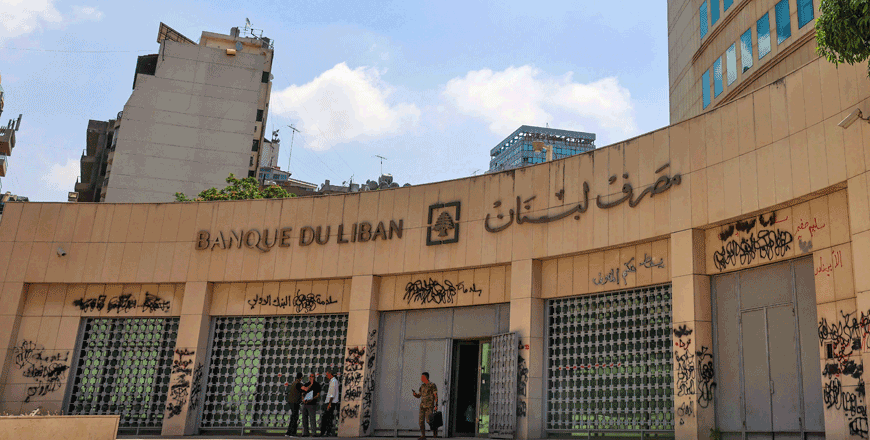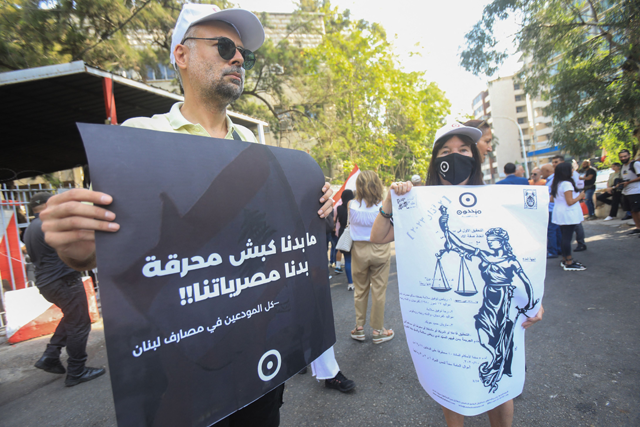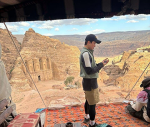You are here
Lebanon's central bank chief ends term with no successor
By AFP - Jul 31,2023 - Last updated at Jul 31,2023

People stand outside Lebanon's central bank headquarters in Beirut on Monday (AFP photo)
BEIRUT — The central bank chief of crisis-torn Lebanon, Riad Salameh, who is wanted for alleged financial crimes in several European countries, handed over his post on Monday with no designated successor in place.
First Vice Governor Wassim Manssouri, who will temporarily take over, warned that "we are at a crossroad" and urged politicians to implement reforms demanded by the International Monetary Fund in return for a bail-out loan.
"This is the country's last chance," Manssouri said at a press conference, as Lebanon has endured a four year economic crisis that the World Bank has labelled one of the worst in modern history.
Lebanon's deeply divided political class has failed to agree on a permanent replacement for Salameh, 73, creating another power vacuum in a country that also has no president and is ruled by a caretaker government.
Salameh, who held the post for 30 years, is a key figure of the Lebanese political elite widely blamed for the country's economic meltdown that has seen the currency collapse and poverty rates soar.
The central bank has extended credit lines from its depleted coffers to the cash-strapped state mainly to pay government employees, subsidise some medicine and finance the country's security forces.
Manssouri proposed to cut all central bank funding for the state while reforms are implemented, to save what is left of its depleted cash reserves.
"We can either stick to the old policies, and we have seen the result... or adopt a new approach and stop funding the state completely," he said.
'A new approach'
Manssouri said halting funding was crucial to preserve the central bank's depleted reserves, which according to the IMF have plunged from $36 billion in 2017 to $10 billion.
Authorities must meanwhile implement reforms, including passing a 2023 budget, a capital control law and bank restructuring in the next six months, Manssouri said.
Reforms should be rolled out as part of a six-month "transitional plan", to be approved by parliament and the government, he said.
Manssouri stayed on the job after threatening to quit because the divided political leadership had promised to support him and his plans, according to local media.
Politics in Lebanon, a country of only 6 million people, is intensely complex as power is shared under a confessional system that recognises 18 Muslim and Christian sects.
Lebanon has been governed by a caretaker cabinet with limited powers for more than a year, and has been without a president for nine months.
Judicial investigations
As Salameh left his post, he remains subject of judicial investigations at home and abroad into allegations including embezzlement, money laundering, fraud and illicit enrichment, charges which he denies.
He is wanted in France and Germany, and Interpol has issued a Red Notice for his arrest, but Lebanon does not extradite its nationals.
Salameh is soon to be tried in Paris, a European diplomatic source told AFP.
In March 2022, France, Germany and Luxembourg seized assets worth 120 million euros ($135 million) in a move linked to a probe into Salameh's wealth.
In February, Lebanon also charged Salameh with embezzlement, money laundering and tax evasion as part of its own investigations.
The domestic probe was opened following a request for assistance from Switzerland's public prosecutor, who is looking into more than $300 million in fund movements by Salameh and his brother.
Defending his legacy, Salameh days ago told a local broadcaster that he had been made a "scapegoat" for the crisis, and blamed the rest of Lebanon's political class for abandoning him "a long time ago".
At the central bank headquarters, employees gathered to bid farewell to Salameh on Monday, to the sound of music and applause.
"The central bank has stood firm," Salameh told cheering employees in a video shared by local media. "During the crisis, it was a pillar that allowed Lebanon to carry on."
Related Articles
BEIRUT — A Lebanese judge on Monday charged central bank chief Riad Salameh with "illicit enrichment" and money laundering after he failed t
BEIRUT, Lebanon — A Lebanese judge Monday issued an arrest warrant for ex-central bank chief Riad Salameh, a judicial official said, after t
BEIRUT — Once lauded for reviving Lebanon's economy, former central bank chief Riad Salameh, wanted abroad and reviled at home after y

















